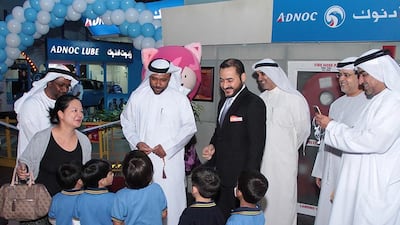Abu Dhabi is to get 44 new petrol stations by next year as part of an investment of up to Dh3.75 billion that will cut queues at the pumps.
Adnoc Distribution plans to build 125 new petrol stations across Abu Dhabi and the northern emirates by next year to address a 6 per cent annual consumption increase, the firm’s chief executive said Wednesday.
The fuel retailer also plans to expand into Saudi Arabia by 2016 as part of plans to reduce losses from subsided petrol sales, which reached Dh6.4bn last year, according to energy minister Suhail Al Mazrouei.
“There is a shortage of petrol stations in the UAE,” said Adnoc chief executive Abdulla Salem Al Dhaheri. “We will add about 125 new stations, out of which 34 are under construction and 15 in the tendering process. The cost is on average between Dh15 to Dh30 million per station.”
Because of the below-market pricing for petrol, fuel retailers in the UAE rely on retail sales from stores and food outlets to generate revenue. Adnoc Distribution's expansion into Saudi Arabia will help improve its revenue from retail sales, given the strong purchasing power of the population in the kingdom, which is around 30 million. Petrol prices in Saudi Arabia are also the cheapest in the Arabian Gulf region, at $0.16 per litre, according to the World Bank.
Adnoc Distribution currently has 222 petrol stations and has taken over 75 petrol stations run by the UAE fuel retailer Emarat in Sharjah, Ras Al Khaimah, Ajman, Umm Al Quwain and Fujairah, in accordance with an agreement signed with Emarat in September 2013.
Adnoc Distribution plans to sign an agreement before the end of March to take over 59 petrol stations in Dubai as part of the second phase of acquiring Emarat stations. Fuel retailer Enoc will also transfer ownership of 26 non-operational service stations in Sharjah to Adnoc Distribution, which will refurbish and rebrand them to become operational this year, he added.
The firm will have about 507 stations by 2016, including the new additions, acquisitions and transfer of ownership of petrol stations.
“In the UAE, the natural increase in local consumption is around 5 to 6 per cent annually,” said Mr Al Dhaheri. “The first contributing factor is economic development and increase in demand for products, and the second factor that supports the increase in consumption is the population growth.”
Adnoc will construct 44 new stations in Abu Dhabi by 2016 alone to remedy the fuel shortage in the capital.
“Because Abu Dhabi city does not have ample free space, within our investment plan for 2015, 2016, we are planning to add petrol stations on the outskirts of Abu Dhabi island,” said Mr Al Dhaheri.
“This will reduce the burden on petrol stations in Abu Dhabi.”
Adnoc Distribution currently imports petrol, but the expansion of Ruwais refinery – which will double capacity to about 830,000 barrels per day when it is fully operational – will meet all local demand.
Adnoc Distribution is also expanding in Saudi Arabia, the Arabian Gulf region’s most populous country, offering its services and brand under a 15-year franchise agreement with Saudi-based Al Olaibi Group. It expects by the end of this year or first quarter of next year to open two petrol stations in the holy city of Medina. It plans to open 20 stations in the first three years of operations and reach 63 in the following years.
“We are focusing on Saudi Arabia. If the operation proves successful, we will look at other countries,” Mr Al Dhaheri said.
Its expansion into the kingdom will help to reduce the company’s losses from the sale of subsidised petrol in the UAE.
Mr Al Dhaheri declined to say how much the Saudi operation would generate in sales.
He also declined to comment on a Federal National Council proposal to lower petrol prices in line with the fall in oil prices.
The price of crude has lost more than half of its value since June last year.
Mr Mazrouei told the FNC on Tuesday that the ministry is looking at regulating petrol prices by taking away the rights of local companies to set them.
The UAE has the highest petrol prices among the six Gulf states.
dalsaadi@thenational.ae
Follow The National's Business section on Twitter

